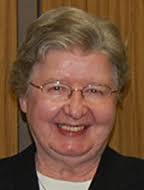Following Jesus
(Heb 4:12-16; Ps 19; Mk 2:13-17)
***********************************
“God accepts us as we are, but believes in whom we can become.”
That quote from Sr. Teresita Kambeitz OSU, underlines the message from today’s readings: we are called to follow Jesus into a new life of mercy, grace and contemplative prayer.

Sr. Teresita Kambeitz OSU
In the gospel, Jesus abruptly breaks off his teaching by the sea of Galilee to speak life-transforming words, “Follow me,” to a least likely person, a tax collector. That simple call changed Levi’s life, as he left everything to follow Jesus.
In the socio-political situation of that time, to be a tax-collector was to be in collusion with the unjust economic system set up by the Roman Empire, gouging its vassal colonies. This Levi (known as Matthew) would have been hated by his own people, seen as a grievous sinner and marginalized by them. That Jesus would call this man to follow him was a shock.
Not only did Jesus call Matthew, he then dined at his house with many of his unsavory friends, colleagues and acquaintances, thus incurring the suspicion and wrath of the scribes and Pharisees who considered themselves holy because they were dedicated to obeying the minute laws of the Jewish religion.

The justification Jesus gives for his actions is memorable: “I have come to call not the righteous but sinners.” That brings to mind the parable of the shepherd who leaves ninety-nine sheep in the wilderness to go after the one who had strayed. Ron Rolheiser OMI poses an interesting question concerning this parable, “Does this mean God love sinners more than righteous persons?” His answer is there are no righteous persons – the ninety-nine sheep are also helpless in the wilderness without the shepherd. We are all sinners, all in need of mercy and healing.
That is exactly what the author of Hebrews promises us in the first reading. Our shepherd is Jesus, the great high priest, Son of God who is with the Father, but who humbly became totally like us, tempted in every way we are except without sin. As Son of God, Jesus was so secure in the Father’s love for him he could say “no” to the temptations in the desert of putting his faith in possessions, prestige and power, the same temptations surrounding us and tempting us everyday. So now we can “approach the throne of grace with boldness, so that we may receive mercy and grace to help in time of need.”
Those two words, “mercy and grace” indicate two very basic ways we can follow Jesus into a new life – receiving his mercy and his grace. Mercy flows into forgiveness, and grace flows into healing. Jesus, as the Messiah, had a two-fold mission – to redeem and to sanctify, to forgive and to heal, or in other words, to grant us forgiveness for all our sins, and heal us of all our negative attitudes and painful emotions.
In his encounter with Jesus, Matthew received forgiveness for all the ways he had sinned by skimming money off the backs of the poor, and the grace to walk away from that sinful lifestyle and begin a new life of following Jesus, becoming eventually the author of one of the gospels.
The author of Hebrews points out another way we can follow Jesus into a new way of life, and that is by being immersed in the Word of God, whom we know is Jesus himself – the Word made flesh. How inspiring the description of God’s Word in the first reading – “the word of God is living and active, sharper than any two-edged sword, piercing until it divides soul from spirit, joints from marrow; it is able to judge the thoughts and intentions of the heart.”
This passage entices us to practice contemplative prayer – the prayer of resting in God’s presence, soaking up God’s transformative love, allowing the power of the Spirit, through that Word, to penetrate deeper within our inmost being than any counseling, therapy or even spiritual direction can go.
One of the best ways we can do this is Lectio Divina, an ancient way of praying made up of four stages: Lectio or prayerfully reading a passage of scripture; Meditatioor meditating on that passage, asking what God is saying to us through that word; Oratioor praying with that passage for our needs and those of the world, and finally, the most challenging part, Contemplatioor just staying with the passage, resting in God’s presence, trying not to think or feel anything, just allowing the Spirit of God to heal us in whatever way we may need healing.
I remember feeling a little pressured by my schedule one day, and tempted to cut short my hour of prayer, when the thought came to me that the Holy Spirit could accomplish more in one minute than I can do on my own in a whole day, so I resisted that temptation and stayed with my commitment to a holy hour. To my surprise, at the end of that hour, the homily I was working on almost wrote itself. Such is the power of contemplative prayer. Looking back over my life, I can say with some assurance that most of the change or healing that has taken place is due to the time spent in contemplative prayer.
The Eucharist is an opportunity to be like Matthew in the gospel, to hear Jesus invite himself to our house, to our table, to come and dine with us, as we listen to his Word and receive his very body and blood.
May our celebration strengthen our faith in him as our great high priest, Son of God and Word made flesh. May it also grant us forgiveness of sin, heal us of our sinfulness, and empower us to follow Jesus more closely through intimate prayer and loving service.




Let’s follow Jesus by believing in him and trusting him that he will help us whenever we are have any difficulties. Jesus knows who we are and what kind of person we have become. Once we decided to have forgiveness by asking God to forgive our sins and he will heal us for being sinfulness. We keep on build up of all these emotional thoughts and negative attitude towards others. We are unable to face the truth and for give that person for what they have done over the years. They must of done things that are tragic that is against God and being hurtful to people that there is no forgiveness. But, they never thought that God forgives us for who we are and what we have done against him.,You will be grieving and building up these emotions that would control their lives if they do not resolve their problem. Jesus heals us ; hoping we are doing repentance by changing our behavior and attitude to be closer to him. He will lead us to the Kingdom of God. Amen
Thanks again for the following messages and homilies about being devoted to Jesus Christ. May he be with us and healing us internally and spiritually. Enjoy the rest of the vacation. Bishop Sylvain Lavoie.